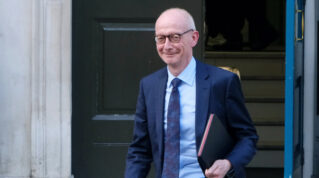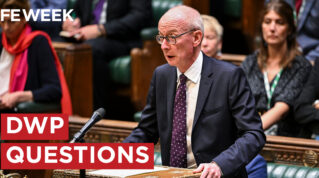Gavin Williamson’s resignation aside, this year’s political omnishambles has momentarily paused. Once again, we have a whole new Department for Education team.
The third prime minister of 2022, Rishi Sunak has already described skills as his “silver bullet”. Unfortunately for those looking for quick progress or a radical reform agenda, the skills and FE sector might find itself a long way behind a frankly terrifying raft of national and international crises on number 10’s to-do list.
With Downing Street distracted, it might come as reassurance to some that the new ministerial team brings some much-welcome experience and, hopefully, competence. Most of the new line-up have worked in the DfE before, or have a background in education. They’ll certainly need this sector knowledge to deal with what could prove a massively challenging few months ahead. The team must navigate industrial action on pay, big budget cuts, the much-promised, but not yet confirmed, apprenticeship levy review, the ongoing T level roll-out, and the lifelong learning entitlement.
Gillian Keegan’s appointment, as a former apprentice and apprenticeships minister, means that in particular there’s likely to be a big departmental focus on FE and skills. Given her business background, there might well also be a renewed focus on workplace training and upskilling, which have taken a backseat in recent years in favour of schools and higher education reforms.
She’s appointed as ministers of state two political heavyweights who, on paper, come from quite different sides of the education debate.
Nick Gibb returns to Sanctuary Buildings to retake his position as schools minister. A proud traditionalist, he’ll return with a strong drive behind high standards, including pushing for more focus on studying core academic subjects.
What remains to be seen is how long this collaboration lasts
Robert Halfon, formerly skills minister under Theresa May (remember her?) has spent the past five years holding Gibb and his other new colleagues to account as education select committee chair. His new brief is enormous, covering skills, apprenticeships and higher education. His two favourite words – degree apprenticeships – align particularly well with Keegan’s interests.
But Halfon’s education worldview very much rejects the primacy of knowledge over skills – rather seeing both as crucially important. While Gibb would be happy for knowledge and academic subjects to dominate up to the age of 16, Halfon is a much stronger champion of skills-based technical education right through the education system and curriculum, with a particularly strong focus on education being suited to future work.
It’s therefore no surprise that Gibb and Halfon have had their fair share of heated exchanges in select committee hearings over the years on whether or not the curriculum should be focused on preparing pupils for work (including a particularly bizarre argument about the taxonomy of a fish).
Their competing views on education could come to a head on plans for a new British Baccalaureate. On the one hand, this might see a knowledge-rich focus on English and maths to 18 for all students. On the other, it could be a radical overhaul of academic and vocational routes that sees a boost to technical and vocational education, and an end to the political obsession with A levels. I’ll leave readers to work out which version might suit which minister best.
It’s worth pointing out that Halfon and Gibb appear, at least initially, to be more likely to work in the spirit of collaboration. In a joint op-ed supporting Sunak for The Times during the campaign, they both backed the new PM’s ambition to build on the education reforms the Conservatives have led since 2010. What remains to be seen is how long this lasts and, crucially, how the new secretary of state will manage her opinionated and experienced junior colleagues.
At best, we’ll see a strong team effort from the DfE with a shared vision for skills reform and the experience to make some progress, even if a skills revolution feels a long way off. At worst, we’ll see blue-on-blue ideological in-fighting that paralyses internal decision-making and distracts from the mission of future education reform.
Given recent months, I’ve given up making bets on what the future holds.















Is this the same public first that takes money of the government to peddle policies and come up with new ones to …you’ve guessed earn even more fees. Talk about touting for business!!!